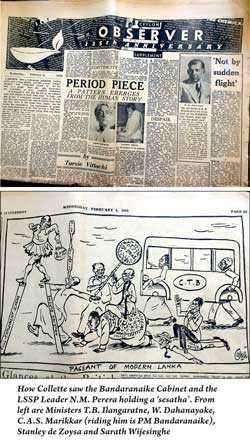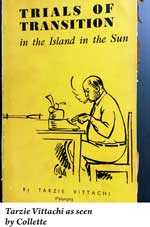Tuesday Feb 17, 2026
Tuesday Feb 17, 2026
Saturday, 27 April 2019 00:00 - - {{hitsCtrl.values.hits}}
Year 1959 was a significant one for the Associated Newspapers of Ceylon Ltd. (ANCL), best known as Lake House. In the early part of the year the Ceylon Observer celebrated its 125th year. The year ended with the Dinamina completing 50 years.

The Ceylon Observer being an evening daily came in handy for us on the Dinamina when we could follow up its news stories.
“A newspaper’s life, like the life of an ordinary man and woman, is lived from hour to hour and day to day. A newspaper records events in live detail. The best reporters are able to convey more than the bare facts of the news: they report also the colour, the atmosphere, the expressions of people and, most important of all they provide a look into the inner state into the people whose lives and times they are recording. This is the distinction between a live newspaper and a dead one. It also distinguishes a live record of human behaviour and an academic history dug out, however ‘scientifically’ and conscientiously from dead documents in musty museums and archives.”
The quote is from the ‘Period Piece’ the legendary editor Tarzie Vittachi wrote as the lead article in the Supplement commemorating the 125th anniversary of the Ceylon Observer on 4 February 1959. In the 1950s the Observer in a way revolved round two personalities – editor Tarzie V and cartoonist Aubrey Collette. In the D.R. Wijewardene era Tarzie V had joined the Observer in 1947 and Collette had moved over from the Times of Ceylon. The Observer was published as an evening newspaper during the week and on Sundays as the Lake House English Sunday paper. The morning English daily was the Ceylon Daily News. One-time teacher at St. Joseph’s College Cecil Graham was the editor in the 1950s.

The two papers were different in their style. As my one time journalist colleague E.C.T. Candappa writes in his book ‘Headlines and Deadlines,’ the Daily News was “staid and stodgy”. The Observer by contrast was “bright, breezy and buccaneering”.
Tarzie V wrote a weekly column, ‘Bouquets and Brickbats’ under the pseudonym Fly-By-Night illustrated by Collette which soon became the most widely read ‘Sunday special’. To quote ECTC: “It lampooned good-humouredly politicians and people of the upper class society. The humour was such that even the victims could enjoy it and, indeed, were flattered to be featured. It was withal an incisive look at politics and society in the mid-20th century. It attacked double standards, pretence, social extremism: they were excellent pieces of satire.”
‘Trials of Transition’ – a Lake House publication of Fly-by-Night columns with a cover featuring Tarzie Vittachi by Collette was a bestseller. The introduction to the author says: “Flybynight’s talent is in uncanny knack he has of making what is vaguely familiar into something shockingly obvious: the Bambalawatte Boys and the Hoity-toity ladies of Colombo 7 have always had their existence somewhere, but it was Flybynight who brought them out into the glare of the spotlight and kept them squirming there.

“His descriptions of a type have sometimes been so accurate that Roland Bulathvitas and Insurance Agent Silvas have appeared in person to take exception to the candid-camera studies he has made of them.”
On Fridays the evening Observer had more than double the normal sales because of the racing news it carried. Those who were addicted to horse racing held every Saturday at the Havelock Racecourse claimed the Observer gave them valuable tips. Though the rich enjoyed racing and could afford to spend on betting, it was a burden on the low-income level types. It virtually became a political issue and during the first year of the Bandaranaike regime racing was banned.
The Observer which was the most longstanding paper – it was started in 1834 as ‘The Observer and Commercial Advertiser’ – ceased publication in 1982 after a record 148 years. D.R. Wijewardene bought the paper in 1923. The Sunday Observer continued.
The publication of the other English evening daily, The Times of Ceylon, was stopped in 1985 after 119 years. Thus marked the disappearance of evening dailies.